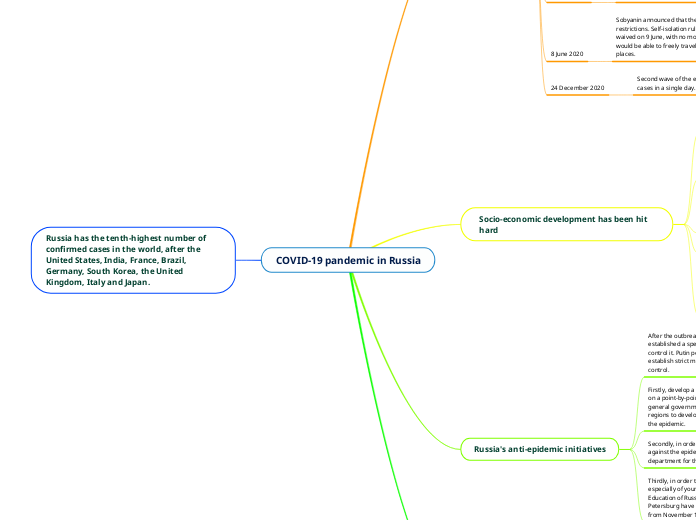COVID-19 pandemic in Russia
Timeline
31 January 2020
The first two cases in the country were confirmed, one in Tyumen, Tyumen Oblast, and another one in Chita, Zabaykalsky Krai. Both were Chinese nationals.
19 March 2020
The first death of a patient with confirmed COVID-19 was reported in Moscow.
25 March 2020
President Putin announced that the 2020 Russian constitutional referendum would be postponed due to the epidemic. He said that the next week starting on 30 March would be non-working nationwide and urged Russians to stay at home. Later, the non-working period was prolonged twice, lasting until 11 May.
29 March 2020
Mayor of Moscow Sergey Sobyanin issued a stay-at-home order starting the next day. On 30 March, similar orders or recommendations were announced in numerous other federal jurisdictions, with many more announcing such restrictions over the next few days.
30 April 2020
Prime Minister Mishustin said that he tested positive for the virus.
1 May 2020
First wave of outbreak peaks with 11,656 confirmed cases in a single day.
27 May 2020
Sobyanin announced that some restrictions in Moscow would be eased on 1 June, with all non-food stores and some service sector businesses re-opening and residents would be able to go outside for walks and sport according to a schedule.
8 June 2020
Sobyanin announced that the city would lift coronavirus restrictions. Self-isolation rules and travel permits would be waived on 9 June, with no more walking schedules. Residents would be able to freely travel around the city and visit public places.
24 December 2020
Second wave of the epidemic peaks with 29,935 confirmed cases in a single day.
Socio-economic development has been hit hard
The COVID-19 pandemic is seriously affecting the political, economic and diplomatic work of Russia in 2020.
Firstly, low energy prices have dealt a huge blow to Russia's finances, and the contribution of energy revenues to Russia's The contribution of energy revenues to the Russian state budget has been significantly reduced.
Secondly, Russia's local finances are stretched, businesses are struggling, poverty rates are rising sharply, and the number of low-income people is once again approaching 20 million. The number of low-income people is again approaching 20 million, and 6.1% of the middle class has fallen into poverty.
Thirdly, the population has declined significantly.
Fourthly, public opinion is pessimistic. According to a Levada poll conducted in November 2021, percentage of those who are concerned about getting infected with COVID-19 is 48%, while those not concerned 50%, while 39% personally knew someone who survived COVID-19 infection in acute form and 27% knew someone who died as result.
Russia's anti-epidemic initiatives
After the outbreak of the COVID-19 pandemic, Russia has established a special mechanism to combat the epidemic and control it. Putin personally issued a presidential decree to establish strict measures to ensure that the epidemic is under control.
Firstly, develop a national mechanism for fighting the epidemic on a point-by-point basis. Through a presidential directive, the general government is responsible for directing and the regions to develop specific point-to-point measures to combat the epidemic.
Secondly, in order to strengthen the effectiveness of the fight against the epidemic, Russia has established a special state department for the fight against the epidemic.
Thirdly, in order to reduce the mobility of the population, especially of young people, the Ministry of Science and Higher Education of Russia issued All universities in Moscow and St. Petersburg have been ordered to switch to distance learning from November 13, 2020 to February 6, 2021.
Impact on domestic and foreign affairs
In addition to posing a great threat to the lives and safety of the Russian population, the new crown epidemic has had a profound impact on domestic and foreign affairs.
Firstly, the anti-epidemic tests the Russian political system.
Secondly, test the relationship between central and local.
Thirdly, the test of social stability.
Fourthly, the test of Russia's foreign policy.
